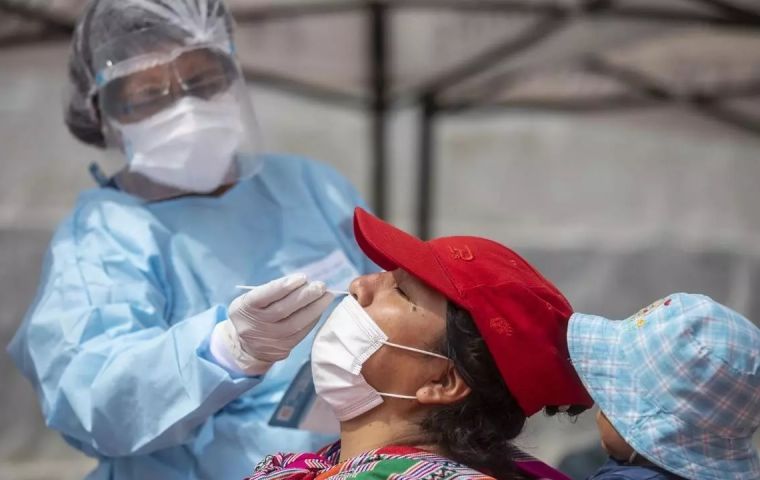MercoPress. South Atlantic News Agency
WHO focuses on possible dangers of coronavirus lambda variant
 The Andean strain is for now a “variant of interest” but it may become a “variant of concern.”
The Andean strain is for now a “variant of interest” but it may become a “variant of concern.” The World Health Organization (WHO) has decided to focus on the possible threats by the coronavirus variant known as Lambda, which was first found in August 2020 in Peru, when it was called C.37 or “Andean.”
In its weekly report, the WHO labelled the strain as a “variant of interest” after being detected in at least 29 countries, mainly throughout Latin America.
The WHO report points out that the variant has “a series of mutations with suspected phenotypic implications, such as a possible increase in transmissibility or a possible increase in resistance to antibody neutralizers.”
The Geneva-based organization now needs to determine whether the Andean variant, which accounts for 37% of the cases detected in Argentina, could be just as risky as the Alpha, Beta, Gama and Delta strains. In Argentina, an increase in the circulation of the lambda variant was identified in the third week of February 2021.
The determination to include the Lambda variant in the “variants of interest” means that the behaviour of the strain in terms of contagion power is studied and, if it is high, it could be added to the category of “variants of concern”, which includes the strain Alpha, Beta, Gamma and Delta.
The WHO divides the variants into those of “interest” and those of “concern,” the latter including the British Alpha, the Indian Delta and the Brazilian Gamma.
According to the latest WHO report, Lambda is associated with “substantial community transmission rates in several countries,” including Peru, Chile, Argentina, and Ecuador.
In Peru, more than 80% of contagion cases are associated with the lambda variant. Last month, the country recorded the highest mortality rate globally
In Chile, its presence has increased rapidly over time and today it represents 32% of the sequenced cases reported in the last 60 days, according to the WHO. This implies that lambda is circulating at rates similar to the Brazilian Gamma variant (33%) and well above the British Alpha (4%).
While Argentina “reported an increasing prevalence of lambda since the third week of February 2021, and between April 2 and May 19, 2021, the variant represented 37% of sequenced Covid-19 cases,” the WHO has reported.
Regarding the symptoms of this new variant, no major changes have been reported compared to those already known with the other mutations but, based on some anecdotal reports from doctors, there could be a higher frequency of intestinal problems.




Top Comments
Disclaimer & comment rulesCommenting for this story is now closed.
If you have a Facebook account, become a fan and comment on our Facebook Page!